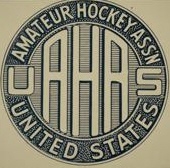United States Amateur Hockey Association: Difference between revisions
No edit summary |
No edit summary |
||
| Line 1: | Line 1: | ||
{{Infobox sports league | {{Infobox sports league | ||
| title = United States Amateur Hockey Association | | title = United States Amateur Hockey Association | ||
| logo = | | logo = USAHA logo.jpg | ||
| logo_size = 150px | | logo_size = 150px | ||
| sport = | | sport = | ||
Latest revision as of 15:08, 21 February 2020
| United States Amateur Hockey Association | |

| |
| Sport | |
| Founded | 1920 |
| No. of teams | 8 to 15 |
| Country(ies) | United States |
| Ceased | 1925 |
The United States Amateur Hockey Association was an ice hockey governing body in the United States from 1920 to 1925, which operated at an amateur level. The league was filled with predominantly Canadian-born players, but struggled to achieve consistent attendance figures in the days before large arenas with artificial ice. The association disbanded in 1925, with some teams eventually joining the American Hockey Association, and one team joining the National Hockey League.
A league was formed with three groups:
Group 1 (East)
Group 2 (Central)
Group 3 (West)
History
The United States Amateur Hockey Association (USAHA) was founded on October 25, 1920 in Philadelphia. The International Skating Union of America which had governed ice hockey until then, resolved to turn over control of the sport with the approval of the Amateur Athletic Union (AAU). The USAHA also inherited the existing affiliation agreement with the Canadian Amateur Hockey Association (CAHA), which allowed teams from the USAHA to play against teams in either the AAU or the CAHA.[1]
W.S. Haddock from Pittsburgh was elected the first president of the USAHA. The original eight teams in the USAHA included the Pittsburgh Yellow Jackets, and teams from Boston, Cleveland, New York City, Philadelphia, and three from Minnesota including Duluth, Eveleth, and Saint Paul. Later additions were the Boston Athletic Association, the Fort Pitt Hornets, Milwaukee, Minneapolis, and three transfers from the American Amateur Hockey Association which included teams from Calumet, Houghton and Sault Ste. Marie, Michigan.[1]
The USAHA divided its team into three divisions for the first two seasons, with teams grouped in the east, the mid-west and northwest. From 1922 onward, the association was grouped into eastern and western divisions.[1] Persistent disagreements between the USAHA and the CAHA led Silver Quilty to cancel the agreement in 1925.[2] The USAHA disbanded partway through the 1924–25 season. The Pittsburgh Yellow Jackets joined the National Hockey League, and the western teams were reorganized as the Central Hockey League in 1925, which later became the American Hockey Association in 1926.[1]
The association had faced difficulties with consistent refereeing, and the lack of suitable ice for the whole season since most teams played on natural outdoor ice surfaces instead of arenas. The Minneapolis Arena, and the Duquesne Gardens in Pittsburgh were the largest rinks at the time. The association also struggled with attendance figures due to the varying arena capacities.[1]
The league was ostensibly amateur. But increasingly, Canadian players came down to join these teams. They would, of course, be paid in some way. The league's playoff champions were awarded the Fellowes Cup.
The USAHA was a victim of its own success. The admission of the Boston Bruins in 1924 and the Pittsburgh Pirates in 1925 to the National Hockey League took away two of its best cities. The league played its last season in 1924-25. The remaining teams in the western section formed a new league - the Central Hockey League. This became the American Hockey Association in 1926-27.
Fellowes Cup champions
- 1920-21 Cleveland
- 1921-22 Boston Westminster
- 1922-23 Boston AA
- 1923-24 Pittsburgh Yellow Jackets
- 1924-25 Pittsburgh Yellow Jackets
List of seasons
- 1920-21 USAHA Season
- 1921-22 USAHA Season
- 1922-23 USAHA Season
- 1923-24 USAHA Season
- 1924-25 USAHA Season
References
| This page uses Creative Commons Licensed content (view authors). |
| This page uses Creative Commons Licensed content from Wikipedia (view authors). |